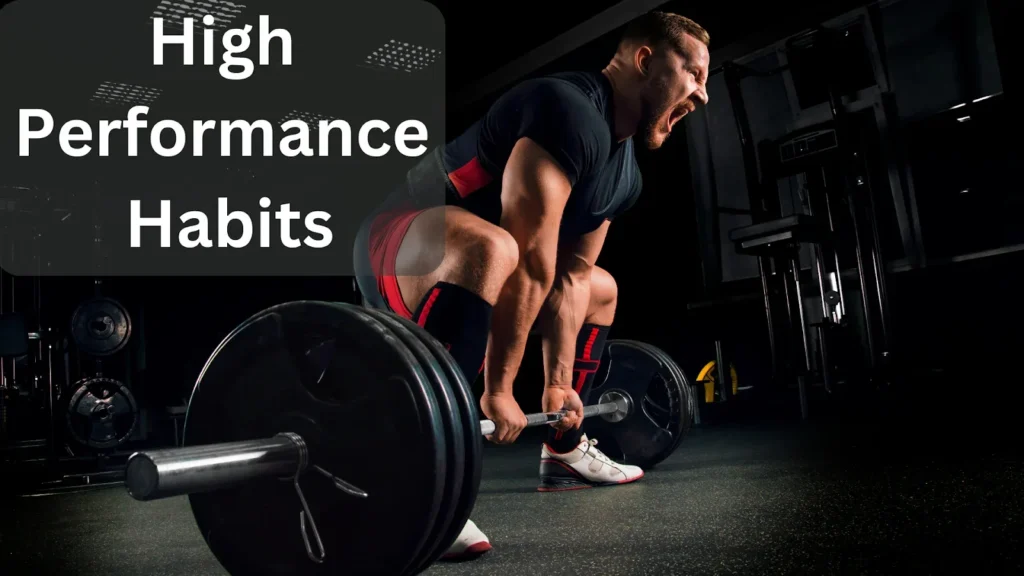
You are reading this because you want to cut through the clutter of information and identify the high performance habits that actually work.
So let’s turn to the largest academic study on the habits of high performing people, conducted by Brendon Burchard and published in his best selling book, High Performance Habits: How Extraordinary People Become That Way1. I’ll summarize each of the six habits, give a practical example to follow, and add a unique perspective based on my experience helping high achievers overcome their obstacles to excellence.
Before we start, please understand that these are deliberate habits, meaning you have to do them on purpose, with focus and consistency. This is not about information gathering. These are NOT “tips” to be done on occasion.
The idea behind high performance habits is that you intentionally make them a part of your everyday actions.
These six high performance habits are not innate qualities. They are learnable and improvable. Anyone can become a high performer by developing and practicing these habits consistently.
With that in mind, let’s start with three personal high performance habits.
1 – Seek Clarity
Finding and following your purpose gives high performers focus and direction in everything that they do.
Find clarity in who you are. Ask “who do I want to be?” and be specific about what that would look like.
Then ask, “am I currently acting that way?” Often we find our actions are inconsistent with our desired outcomes. It can be uncomfortable to look at this discrepancy. And when you embrace it, the gap between your reality and your dreams starts to close.
Leading to the next question, “What do I need to change to get there?”
Now you have clarity on the specific behaviors to target. Now you can make the necessary changes that matter.
Find clarity in your social sphere.
You can have good relationships only when you are intentional about how you treat others.
Helpful questions to ask before interacting are:
- How can I be a good person or leader in this situation?
- What will the other person need?
- What kind of mood and tone do I want to set?
High performers are very clear about the skills they need to develop to win. Look toward the future. Identify key skills. Obsessively develop those skills.
And finally, when someone becomes disconnected from their contribution to the future, they underperform. So high performers guide their daily activities in service of others, providing meaning to their actions and keeping them motivated.
2 – Generate Energy
If you want to be great, you will need a lot of energy to get there. This doesn’t happen by accident. That’s why generating physical, mental and emotional energy is a high performance habit.
When you have low energy, it can be difficult to do what it takes to generate the energy you need to perform at a high level. A “which comes first, chicken or the egg” scenario. So let me share with you this sobering information to motivate you to take action to generate energy if you are lacking it now …
Lower energy correlates with lower overall high performance scores. The lower your energy:
- the lower your happiness
- the lower your enthusiasm for taking on challenges
- the lower your perception of your success versus your peers’ success
- the lower your confidence in the face of adversity
- the lower your degree of influence on others
- the lower the likelihood that you’ll eat well or exercise.
In short, generating energy is a foundational high performance habit that will support the others.
So here are a couple ways to increase it:
- Improve your sleep quality and duration. Even if you are “getting enough” with 7-8 hours, getting 8-9 will have performance enhancing effects. This brief yet comprehensive workshop will have you identify and overcome the barriers interfering with your recovery and help you build a nighttime routine that will have you sleep better tonight so you can perform better tomorrow.
- Exercise. The research is clear. Besides increasing physical energy, exercise helps you learn faster, remember more, and improves overall brain function. Exercise decreases stress, which kills mental performance. Exercise enables you to perform general tasks more quickly and efficiently. It boosts working memory, elevates mood, increases your attention span, and makes you more alert, all of which increases your performance.
If the benefits of sleep and exercise were contained in a pill, how much would you pay for that medication? It would be a billion dollar industry.
You can have all these benefits for free. The only thing it costs you is some discomfort as you take action.

3 – Raise Necessity
The third high performance habit is to raise necessity. Necessity is the emotional drive that makes great performance a must rather than a preference. More than wanting to do something, necessity demands that you take action.
When high performers are asked why they work so hard, they respond: “This is what I was made to do,” “People are counting on me,” or “If I don’t do this now, I’ll regret it forever.”
Burchard calls identity, obsession, duty, and urgency the Four Forces of Necessity.
High performers have high personal standards and commitment to excellence. It is a part of their identity, of who they are as a person. It is innate. It’s true whether or not they chose the task. It is true whether or not they enjoy the task. High performers hold themselves to a high standard because that’s who they are and that standard fuels their effort.
High performers are obsessed with understanding and mastering a topic. This is often driven by a deep curiosity about their chosen field of interest. This obsession is seen as passion and perseverance and is demonstrated in the deliberate practice that leads to expertise.
The previous two forces are internal, the next two are external.
The first being a sense of social duty, obligation, or purpose. That might mean a sense of owing something to others, or being accountable for their performance to someone else. Maybe it is an obligation to meet someone else’s expectations or needs. Sometimes duty means complying with the norms or values of a group, or a moral sense of right and wrong.
Urgency may be best created by real deadlines. Notice how your motivation to train increases as the race approaches. Or the pressure to study peaks the night before a test. The real deadline on paying your taxes may be determined by how much in penalties you are willing to pay. Real deadlines are states that matter because real consequences happen on that date if they are not met and benefits come to fruition if they are.
Now we get into the social habits.
4 – Increase Productivity
This is a no-brainer and almost cliché with how often it is talked about. The problem is a lack of follow through. So as you read this section do more than consume the information. Set an intention to take action and do each of these steps.
High performers have a very deliberate approach in planning their days, projects, and tasks compared to underperformers. And then they follow that plan.
Productivity does not come at the cost of compromising your well being (e.g., sleep, exercise, healthy diet) or disrupting your sense of balance. Extra caffeine isn’t needed either!
Productivity does come down to mastering the basics of setting goals, and maintaining energy and focus. When you have clear and challenging goals, you tend to be more focused and engaged. This increases flow and enjoyment. Enjoyment is correlated with greater productivity.
We discussed the many benefits of energy above. You’ll need that energy to increase productivity.
Focus is critical. I cover 5 essential focus strategies for you here.
And be sure to take a two to three minute break every 45- to 60-minutes of your day to keep your brain fresh.
5 – Develop Influence
We can define influence within high performance habits as the ability to shape other people’s beliefs and behaviors as you desire. Of course, this doesn’t mean manipulation. Remember the benevolent purpose you clarified in habit #1 and your positive social sphere intentions. Within that, you can get people to believe in you and your ideas, buy from you, follow you, or take actions you request of them.
You develop influence first by asking. People say yes more often than we expect. Three times more actually2!
Underperformers frequently fail to ask.
And don’t ask just once. The more you ask and share your ideas. The more people become familiar and comfortable with what you are asking for and the more they warm up to the idea.
Start by asking questions about what they think, want, need and feel. People support what they create. They want to back the ideas they helped create, so include them in the process.
High performers have a giving mindset, so among all the asking don’t forget to give. Carefully consider the problems people face. Give suggestions, resources and connections.
You can also gain influence by offering sincere appreciation for those you seek to influence. Offer gratitude. Become their champion and cheer on their good ideas. Praise them in public when they do well. Trust them. Give them autonomy to make decisions.
6 – Demonstrate Courage
The last high performance habit is demonstrating courage.
Let’s be clear. If you aren’t scared, if there isn’t a significant risk, there is not an opportunity to demonstrate courage. Bravery is not the absence of fear but what you do when you feel afraid. Courage is demonstrated when you act with fear in a positive direction.
Those who demonstrate courage tend to have the other five high performance habits of clarity, energy, necessity, productivity and influence. Courage doesn’t work alone. All six habits work together. Courage is often the cornerstone upon which the others are built because of that fear factor.
Fear is so often the thing that holds us back. You may call it anxiety, doubt, or a lack of confidence. It is when your head is overthinking and asking “what if …?” questions. Those scary thoughts and feelings prevent us from taking action. This is when courage is needed.
High performers report the following attitudes that increase courage:
- They love mastering challenges
- They see themselves as assertive and confident
- They see themselves as high performers and more successful than their peers
- They are happy with their life overall.

The biggest factor, however, is in the action you take.
This reminds me of a Success Stories Community member, let’s call her Julia, who was assistant principal flute in her city’s symphony. After being passed over for the principal position she wanted to audition across the country to further her career. Fear of failure and being embarrassed and a strong belief in “I am not good enough” paralyzed her. She even paused in the airport en route to an audition, was overcome by fear, and turned around to go home.
By developing her skills to distance from the fearful thoughts and feelings, accepting them as they were without believing them, she began to take courageous steps.
First she filmed her playing and gave it to coaches for feedback despite the fear of their criticism while her mind relentlessly criticized her.
Then she performed in front of peers, again courageously open to their feedback.
This success fed her other habits as she focused on her goal to be the best professional she could be. She improved sleep habits to increase energy. As it was later in her career, she put helpful pressure on herself to take risks now before her retirement. She was complimentary of her peers, building influence. She intensified her deliberate practice habits to improve skills and build confidence.
Now, she is fully engaged in auditioning at some of the best orchestras in the U.S.
Her fear is still there. It just no longer controls her as she demonstrates courage in the face of it.
How can you demonstrate courage?
Are you a business owner starting a new business, even though you don’t have all the answers?
Or are you a student applying to a top university, even though you know it’s a long shot?
Are you an injured athlete, training for a major competition in a new way despite the uncertainty of your healing timeline?
Are you a social activist fighting for a cause you believe in, expressing opinions that you know will be challenged?
High Performance Traps
Burchard warns of three traps that will undermine these high performance habits.
The first is an attitude of superiority. When you are outperforming others, it is easy to get a big head. Do you think some of the people you work with are idiots and dismiss their ideas? Do you not ask your team to review your presentation because you “got this”? You might be inching closer to an attitude of superiority that will hurt your performance.
The second is dissatisfaction. Remember that high performers are happier than most people. This doesn’t mean to squelch the hunger that drives you. It does mean to take stock in your accomplishments and enjoy the process along the way.
Finally, neglect can creep up on you. As you relentlessly pursue your goals, you might end up ignoring other areas of life: family, friends, health, recreation, recovery. In time, these areas fight back for attention. While you may not find a work-life balance, you can achieve harmony (more on how here). The key is to remain aware and listen to the feedback your spouse, children, friends and body may be giving you before it is too late.
The Most Important Thing
If we wanted to break it all down to the #1 thing it takes to be a high performer, it would be confidence.
To be confident, Burchard found that high performers thought about things that gave them more confidence, did things that build confidence, and avoided things that drained confidence.
Here are the three practices he suggests to build confidence:
- Develop competence: Confidence is the direct result of preparation. Preparation leads to the development of needed skills and you become competent with practice. In this way it is more of a behavioral skill than a mental or emotional one.
- Be congruent: This is a fancy way of saying be clear on your values and identity, then act is a way that reflects them. Put another way, be authentic and genuine to who you are and who you want to be.
- Enjoy connecting: When you connect with others, you learn more about yourself and the world. You learn new ways of thinking, new skills, and new ways of serving. Confidence can come from a genuine desire to learn about and from others.
Build your confidence and connect with and learn from others as we develop high performance habits in our Success Stories Community.
I look forward to helping you achieve consistent excellence in your field and achieve the sense of satisfaction that only comes from when we are at our best.
References
- Burchard, B. (2017). High performance habits: How extraordinary people become that way. Carlsbad, CA: Hay House, Inc.
Flynn, E.J., & Bohns, V.K. (2012). Underestimating one’s influence in help-seeking. In D.T. Kenrick, N.J. Goldstein, & S.L. Braver (Eds.) Six degrees of social influence: Science, application, and the psychology of Robert Cialdini (pp. 14-26). Oxford, UK: Oxford University Press.



